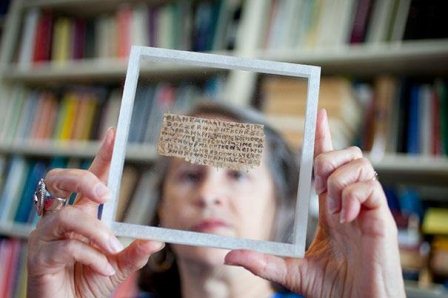 (CNN) -- If you set your DVR to record the Smithsonian Channel's documentary on the "Jesus Wife" papyrus fragment two weeks ago and it didn't, it wasn't your fault.
(CNN) -- If you set your DVR to record the Smithsonian Channel's documentary on the "Jesus Wife" papyrus fragment two weeks ago and it didn't, it wasn't your fault.
Despite the massive publicity the documentary received after the discovery was announced, the Smithsonian Channel has delayed the release of the film about the Coptic fragment with the phrase, "Jesus said to them, 'My wife..." to wait for further testing on the fragment.
"We have been allowed exclusive access to this discovery for months. Our program will take into account the upcoming tests as well as the academic response to the initial announcement," Tom Hayden, general manager of the Smithsonian Channel, said in a statement sent to CNN on Tuesday.
Academics have expressed skepticism about the fragment's authenticity following an announcement about it last month from Harvard professor Karen King.
King has posited in a draft article, tentatively accepted by the Harvard Theological Review, that the papyrus dates to the fourth century but that it could be a copy of a lost second century text.
The papyrus found its way to King in 2010 from a collector. She translated the Coptic, an ancient language used by Egyptian Christians, and discovered the phrase that made heads turn around the world.
But the fragment, which is about the size of a business card, also contains other phrases, which have stoked academic skepticism.
Many have noted its striking resemblance to the Gospel of Thomas, an early Gnostic Christian book containing sayings attributed to Jesus that were decided to be non-canonical and are not included in the Bible. Mark Goodacre, an associate professor of religion at Duke University, wrote on his NT Blog that the text on the papyrus was "a patchwork of pieces from the Gospel of Thomas."
That could suggest the piece of papyrus accurately dates back to the fourth century but a modern forger came along and added the text.
When asked about the progress of the chemical testing of the ink a spokesman for the Harvard Divinity School and the Harvard Theological Review refered back to a statement from last month.
"Karen King's 'marriage fragment' paper, which Harvard Theological Review is planning to publish in its January, 2013, edition -- if testing of the ink and other aspects of the fragment are completed in time -- will include her responses to the vigorous and appropriate academic debate engendered by discovery of the fragment, as well as her report on the ink analysis, and further examination of the fragment," the statement said.
As for the film, Hayden's statement said the the delay "will enable us to present a richer and more complete story. We will be announcing a new premiere date in the coming weeks."
The Vatican in late September pushed back on the papyrus, with its newspaper calling the fragment "a fake."
"Substantial reasons would lead us to conclude that the papyrus is actually a clumsy counterfeit," the Vatican's newspaper, L'Osservatore Romano, said in an editorial by the newspaper's editor-in-chief Gian Maria Vian.
- Home
- News
- Opinion
- Entertainment
- Classified
- About Us
 MLK Breakfast
MLK Breakfast- Community
- Foundation
- Obituaries
- Donate
04-18-2024 1:22 am • PDX and SEA Weather




















































































































































































































































































































